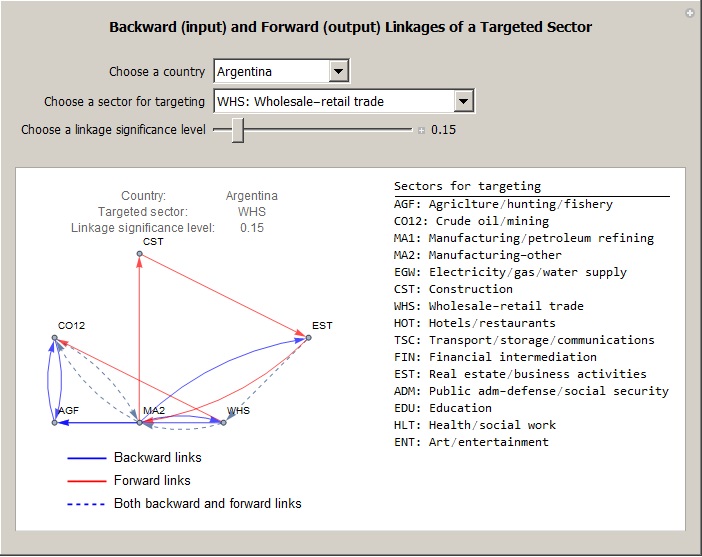ECOREC is an economic research and consulting firm, providing support to the formulation and impact assessment of agricultural research, technology and innovation policies, and policies aimed at food security and poverty reduction. ECOREC offers consulting services in policy advice, research capacity development, and program monitoring and evaluation, to clients in the public, private and non-profit sectors. In its undertakings, ECOREC adopts a multi-disciplinary approach and applies quantitative research methods.

of Input-Output Production Networks
Here is an output from a newly developed Package to analyze backward and forward multipliers of an input-output (IO) matrix. The Algorithm developed by Dr. Temel generates the network resulting from targeting a specific sector at a threshold multiplier level. In the example left, the IO network of Argentina at a threshold level of 0.15 is generated for the wholesale sector. The Package retrieves IO matrices of 64 countries from OECD Input-Output Database. Now, with this Package, targeting a sector is so much easy and informative for the design of policy interventions.

Targeting a Sector, Cascade of Links, Network Resilience
Tugrul Temel and Paul Phumpiu
August 26, 2023
Drawing on input-output data, a computational methodology is proposed to: (i) characterize the upstream and/or downstream network of a targeted (or prioritized) sector i, (ii) uncover the cascade of layers of links in the network constructed, and (iii) measure the degree of network resilience using edge betweenness centrality measure of edges between communities. These objectives are accomplished through three complementary algorithms. The implementation of the algorithms is illustrated using Turkiye's 2018 input-output production network. Ways to design policies are discussed from a network perspective. The key findings are three-fold. First, in network-based policy design, it is highly critical to consider the interdependencies of regulated and seemingly competitive sectors. Efficiencies gained in liberalized markets via pro-competitive PMR can easily be wasted before final consumers benefit from them as regulated industries may exercise their market power to confiscate part of the efficiency gain created in competitive markets. Improved competition in a single market may not generate the desired outcome even if competition policies perfectly support that market because benefits from competition may not spread over the rest of the network due to disruptions in the cascade of interdependencies concerned. Second, a network-based policy design should start with the identification of the "dominant" source and the "subordinate" sink sector(s), and those in between. The source?sink structure of Turkiye's manufacturing network illustrates that the manufacturing sector is the most dominant, whereas telecommunications and transport, energy and construction sectors are the potential sinks where large chunk of input flow ends up. Agriculture, finance and oil extraction-mining seem to be interactive sectors. Third, the cascade of three layers of links are identified, and the upstream network of the manufacturing sector is found to have a mediocre level of resilience against the complete disruption of the intermediate layer of the network.
Characterizing Input-Output Linkages of a Targeted Sector
Tugrul Temel and Paul Phumpiu
September 2021
At present, the world is facing an unprecedented employment challenge due to the COVID-19 pandemic. ILO (2020) expects the largest amount of youth unemployment at the global level to take place in manufacturing, real estate, wholesale, and accommodation sectors. This paper aims to produce information for employment strategy development in China, Japan, India, Russia, Germany, Turkey, UK and USA, which together account for about 60 percent of the world GDP. A novel method is introduced to identify critical input-output backward and froward linkages of a targeted sector. Based on the linkages identified, sectoral dependencies and pathways of interactions in a production system are characterized to uncover critical information for the design of employment policy interventions. Manufacturing is found to be top priority sector to be targeted in all the eight countries, followed by real estate and wholesale sectors, and these sectors should be coupled with isolated communities of sectors to capture external employment effects.